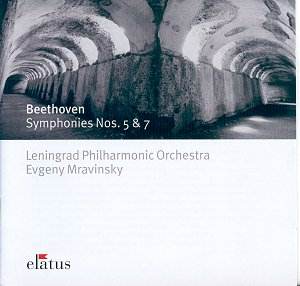This is the real Leningrad Philharmonic of the Soviet
era, superbly drilled and directed by its long-serving Music Director
Evgeny Mravinsky, playing two perennial favourites by Beethoven. The
quality of the playing is first rate and although live, the audience
is quite well–behaved, with only sporadic interference. This recording,
available before at full price on Erato has now been issued on Warner’s
upper mid-price label for us to enjoy.
What is it like, and how does it compare with the competition?
With the hundreds of recordings about for Beethoven Symphonies, I have
concentrated just on this coupling. Top of the pile is the DG disc with
the Vienna P.O. on top form with Carlos Kleiber. Non-British contributions
are also from the Columbia Symphony Orchestra under Bruno Walter, and
the Chicago Symphony Orchestra under Fritz Reiner. We also have the
Royal Liverpool Philharmonic under Sir Charles Mackerras, and the Philharmonia
with either Christian Thielemann, or Ashkenazy. There are others, but
this list shows how severe is the competition when issuing a release
such as this.
Each of these alternatives has much to offer, and I
am afraid that I would still, if pushed, go for the Carlos Kleiber disc.
The Mackerras is the one to go for if you like your Beethoven played
in echt period style (on modern instruments). Personally, I do not feel
very happy with Thielemann but I know that his version is well-liked
in certain quarters. Ashkenazy is pretty good, not like his current
performances and the Reiner and Walter versions are both classics in
their own way.
The fifth under Mravinsky shows conductor and orchestra
in good shape with a notably strong first movement although with a very
untidy initial start. Speeds are middle of the road and after the initial
confusion, the playing is well held together. There is not however the
unanimity of playing and edge-of-the-seat playing that is there right
through the Kleiber version. When we reach the end of the first movement,
the orchestra has warmed up and is playing very well, with the coda
being together and played in a most exciting way, without the least
bit speeding up which some conductors need to get the adrenaline flowing.
The remainder of the work is well done with the finale played in a brash
way which is very exciting, with the Russian brass tone being very much
to the front, particularly on the last chord.
When we arrive at the beginning of the seventh symphony,
the quality of the recording is noticeably inferior to that of the 5th,
but not so much as to spoil the interpretation. The introduction is
well played at a somewhat faster speed than is usual, and this is very
attractive.
Once the introduction is over, the orchestra launches
into the exposition rather cautiously, but the playing is well pointed,
and played accurately, with not too many slips. Because of the relative
differences between introduction and exposition, this almost sounds
as though a different conductor has taken over. The slow movement is
on the fast side of normal, the start being punctuated by some bronchial
Leningraders. The scherzo is fleet of foot, and once again the orchestra
seems to be enjoying themselves immensely. The finale is headlong, although
I have heard some interpretations which are faster, and this movement
brings this disc to a close. I was very pleased to have heard it, as
I am sure will those who buy it. However it is by no means as good as
the Carlos Kleiber version on DG.
John Phillips
